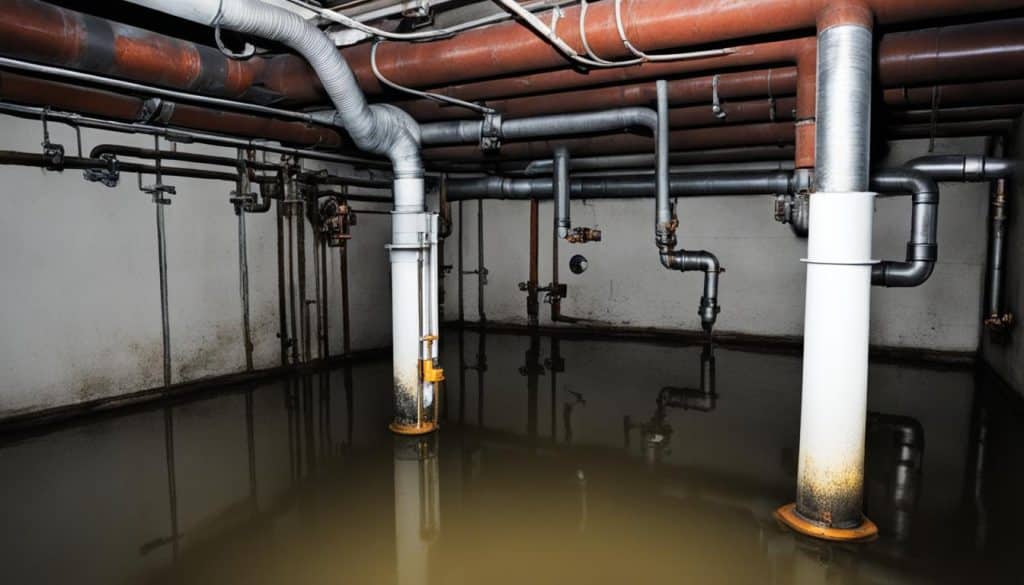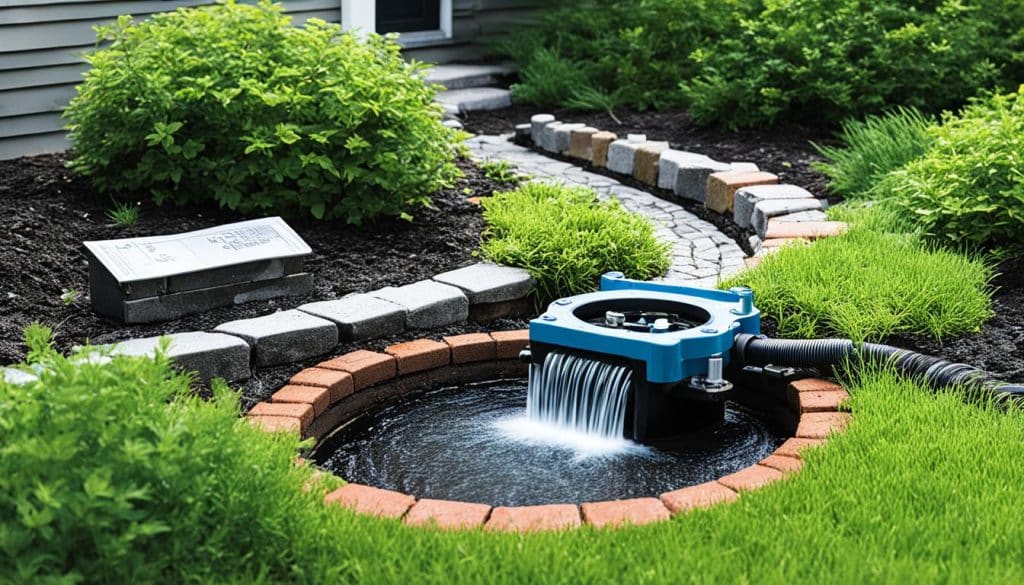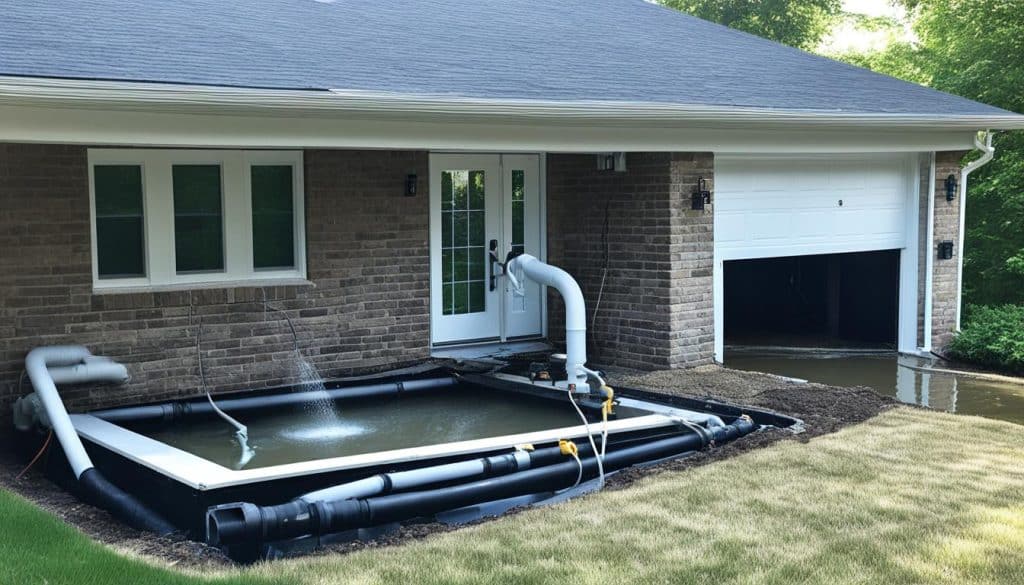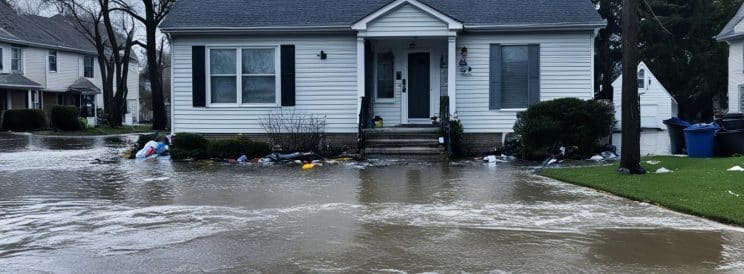In Des Plaines, IL, are you tired of dealing with basement flooding? Most homeowners’ insurance doesn’t cover basement floods from Sewage Backup Des Plaines IL. Is there a reliable way to keep your basement dry and protect your property?
Imagine your home safe from sewage backups and their damages. You’re in luck! J Sewer & Drain Plumbing Inc. exists to grant you peace of mind and avoid sewer backup hassles in your basement.
Installing flood control systems is a key step to prevent sewage backup. These systems divert excess water from your property, reducing flood and sewage backup risks. By installing flood control, you can actively safeguard your home and possessions from sewer backups.
Key Takeaways:
- Basement flooding caused by sewage backup is not typically covered by homeowners’ insurance policies.
- Flood control systems are an effective solution for preventing basement floods and protecting your property from sewage backup.
- Types of flood control systems include standpipes, overhead sewers, and lift stations.
- Overhead sewers, when combined with a battery backup solution, provide nearly flood-proof protection.
- Lift stations use commercial pumps to prevent water backflow during neighborhood sewer backups.
- Contact J Sewer & Drain Plumbing Inc. for sewage backup prevention.
Table of Contents
Common Causes of Sewage Backup Des Plaines IL
Sewage backup is a major problem that can cause a lot of damage and cost a lot to fix. Knowing the main reasons behind it can help you avoid the trouble. Let’s look at some common factors causing sewage backup:

Clogs in Drain Pipes and Main Sewer Line
Clogs in drain pipes and the main sewer line are top causes of backup. Stuff like hair and grease build up over time. This leads to less water flowing and makes blockages. If not fixed, it stops sewage from leaving your home.
Tree Roots Intrusion
Tree roots can also block sewer lines. They grow towards the pipes for moisture and nutrients. As they grow, they can break through the pipes. This causes blockages and sewage backup, needing experts to clear it up.
Old and Damaged Sewer Lines
Older homes may have sewer lines made from materials that wear out like cast iron or clay. These can crack or break, letting soil and debris in. This can lead to flooding in the basement or lower parts of the house.
Heavy Rainfall
Heavy rain can cause a lot of water to flood the city’s sewer system more than it can handle. When this happens, water can push back through pipes into homes. This situation increases the risk of sewage backup and flooding.
Homeowners need to know these causes and act to prevent sewage backup. Doing regular maintenance, like removing clogs, checking and fixing damaged sewer lines, and using backflow prevention tools, can lower the risk.
Preventive Measures for Sewage Backup
To stop sewage backup, take steps to avoid clogs and failures in the system. Use these tips to keep your sewer clean and working well.
The Metropolitan Water Reclamation District (MWRD) is working to fix the sewage backup problem. They’ve started a project known as the Deep Tunnel. It’s meant to store extra rainwater and keep the sewers from getting too full.

Proper Disposal of Grease
Dumping grease and fat down sinks is a big reason for blockages. It’s key to throw grease away right to avoid pipe clogs. Put them in a heat-proof container and toss them in the trash. This action helps dodge costly fixes and headaches.
Paper Products Disposal
Don’t flush paper products like paper towels and diapers; they don’t dissolve like toilet paper. They can block your sewer, so throw them in the trash instead. Keeping these items out of your sewer helps keep the water flowing freely.
Plastic Pipe Installation
Roots sneak into pipes and cause sewage backups. Replace old pipes with new plastic ones to stop this. A plastic pipe keeps tree roots out, giving long-lasting protection from sewer trouble.
Backwater Prevention Valve
In heavy rain or when the system is overwhelmed, a backwater valve stops sewage from entering your home. It lets sewage go out but not come back in, protecting your home. Installing this valve safeguards your home and keeps you worry-free.
Sewage Pump Maintenance
Looking after your sewage pump is key. Check it often for wear, clean its filters, and test how well it works. Regular care keeps it running, avoids big problems, and extends its life.
Conclusion
Sewage backup is a serious issue that can cause a lot of damage. It can lead to flooded basements and water damage. To keep your property safe, it’s important to do some things in advance. For example, you can install flood control systems. These can stop sewage backups and lower the damage risk.
Sometimes, even with these steps, sewage backup can happen. In these situations, it’s smart to call a professional like J Sewer & Drain Plumbing Inc.. They know how to clean up and restore places hit by water damage. These experts use special skills and tools to make sure the area is clean and safe again.
With their help, you can be sure the sewage backup is dealt with properly. They will also take steps to stop it from happening again. So, if you face sewage backup Des Plaines IL, act fast. Let the pros at J Sewer & Drain Plumbing Inc. manage the situation. This way, you can avoid more damage and keep your life on track.

FAQ
How can I prevent sewage backup in Des Plaines, IL?
Installing flood control systems like overhead sewers and lift stations can be very helpful. It’s also key to dispose of grease properly and avoid flushing paper products. Using a new plastic pipe and doing regular sewage pump upkeep are smart moves too.
What are the common causes of sewage backup?
Several things can cause sewage to back up. These include clogs in the sewer line, tree roots, old sewer lines, and too much rain.
How should I properly dispose of grease to prevent sewage backup?
To avoid grease problems, use a heat-resistant container for it. Once it cools and solidifies, throw it away in the trash. Don’t pour it down the drain.
Should I flush paper products like paper towels and diapers?
No, don’t flush paper products. They can clog the sewer. Instead, throw them in the trash to prevent problems.
How can the installation of a new plastic pipe prevent tree roots from damaging the sewer line?
Tree roots seek water and can harm sewer lines. A new plastic pipe is more resistant to cracks. This keeps your sewer lines safe from damage.
What is a backwater prevention valve?
A backwater prevention valve protects your home from sewer backups. It lets sewage flow out but keeps it from coming back in.
How often should sewage pumps be maintained?
Regular maintenance of sewage pumps is key to avoiding issues. Consult a professional to find out how often they should be checked to keep them in top condition.


